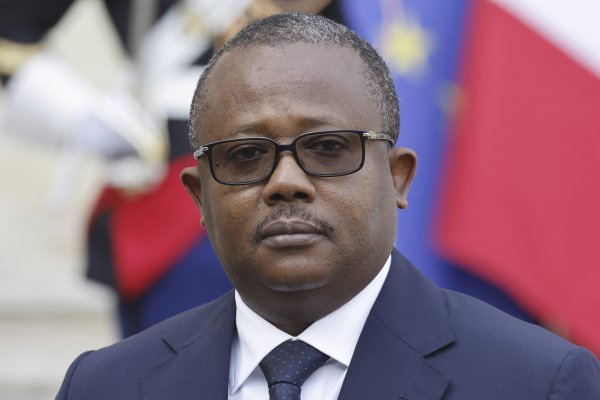The Responsibilities of a State By Abai Francis

The growth and development of a State is not feasible in the absence of positive engagements between it and the citizens residing in any of its territories. In fact, one cannot rule out the roles both have to play in the growth and development of the other, as the benefit of one will surely rub off on the other, and vice versa.
And while both the State and its citizens must play their roles, the first part of this discourse looks at the responsibilities of the State towards such positive engagements. Failure of the State to do the needful will lead to its stagnation or decline in terms of growth and development.
In stating a fact, let us also be mindful that a State is made up of a people termed as citizens who agree to live together within its territories. And for all to move in a common path or direction, certain persons are chosen as its leaders to lead the generality of its citizens. Thus, when we talk of a State, we are invariably referring to those who have control of its collective resources, which bestows on them the responsibility to apply these resources for the general good of the citizenry, both in the short and long term.
So, what roles do a State owe its citizens if it must experience a positive growth and development?
1️⃣ SECURITY
A State owes it a paramount duty to ensure the protection and safety of its citizens and their properties as well as those of non-residents. This security instills in citizens and non-citizens alike a confidence to invest in the State as there is an assurance of protection, not only against the loss of properties but also their lives.
Hence a State ought to give much attention to its security infrastructures in order to provide the necessary expertise through constant training and retraining of its security outfits as well as acquiring tangible security assets to its advantage.
Where insecurity reigns, disinvestment becomes the order of the day and this has a spiralling effect which will not augur well for such a State. An insecure State can never experience any growth or development.
2️⃣ OPPORTUNITIES FOR WEALTH
Every State is endowed with resources, in human and material form. But where opportunities do not exist to tap into these resources, such a State will not make progress. The opportunities for wealth is created largely by the State putting in place a conducive environment (such as security) and the necessary infrastructures in the transport, health, education, power, communication, and other sectors that are important to its growth and development.
For example, citizens need to be equiped or trained to succeed, and this is provided by the education sector. In same vein, to move resources freely within a State, the transport sector must be accessible and cheap. The same is applicable to power, health, communication and the others sectors. It is these infrastructures that results in job and wealth creation.
Because these infrastructures are pivotal to enhancing the economic growth of the State, much funds need to be committed to not only sustain them but improve their performance. Where a State fails to create opportunities for wealth by abandoning or neglecting infrastructural assets, it will lead to high cost of living and poverty among its citizens. This will also result in a lack of investment in the economy of such a State as investors beam their focus on a better destination for their investments.
3️⃣ JUSTICE AND EQUITY
It goes without saying that where there is justice, there is fairness. In a State where no one is bigger than the law but all are made subject to legislation, with justice served no matter whose Ox is gored, breeds much confidence on residents to abide by the law. Also, in a State where citizens are treated equally irrespective of their social status gives a sense of belonging and stems acts of agitations or violence.
A State therefore owes its citizens, irrespective of their ethnic, religious or political affiliations, the right to justice and equity. This engenders peace which is a golden opportunity for birthing the much needed conducive atmosphere for a State to thrive.
But where injustice and inequality reigns supreme, there are bound to be insecurity and violence, all arising from agitations by citizens for recognition and justice.
4️⃣ FREEDOM
Freedom is one of the most precious gift that humanity cherish. Even the Creator exercise this freedom through a free will, which is the right to choose and act based on one's belief or conviction. The essence of freedom was what led most African countries under colonial or foreign rule to clamour for independence.
A State therefore owes it an obligation to give freedom to its citizens to associate as well as speak their minds without any intimidation whatsoever. While it is agreed that there is no absolute freedom, however, as long as such association or speech does not portend or pose a danger to the wellbeing of other citizens, then the exercise of such a freedom should be allowed to persist.
Where citizens are prohibited from associating or from voicing their thoughts could be likened to their being imprisoned psychologically, which is not healthy. Where such restriction exists it will give birth to authoritarianism and results in a system of no check and balance to existing institutions.
5️⃣ HONOUR
It is said that one should give honour to whom honour is due. To render honour is to give recognition to someone as a reward for his/her contributions, which is also a purveyor to others to follow such exemplary act of honour. Where citizens are aware of such a recognition, it helps to breed in them the spirit of patriotism, and to do more for the enhancement of the State.
Thus a State owes it a duty to honour its citizens that have served it by their contributions to its growth and development. A Stare should do all it can to earn the confidence or trust of its citizens and boost their zeal for its positive transformation.
Where those who have sacrificed for their country are neglected or abandoned, it sends out a negative impression to other citizens that they are not of importance to the State. This leads to non-nationalisation and a total lack of commitment to the ideals of such a State. Moreover, a lack of identifying with those who should be accorded as heroes will further cause many to seek citizenship elsewhere where their inputs to nation building will be appreciated.
SUMMARY
Where the above responsibilities are failing, such a State will undermine its pursuit of its growth and development. But where these responsibilities are engaged positively, tranquility reigns in such a State.
A State needs its citizens as much as citizens need the State. However, the duty of first responsibility lies more on the State than on its citizens. This is because the State has the power of influence than any citizen could exert, and this it should use to its advantage by ensuring that it gains the loyalty and patriotism of citizens for the common good of all. When it is said that citizens should think more of what they can do for their country and not what their country can do for them, that responsibility on the part of citizens can only be realised when the State itself is willing to do the needful, or else the efforts of citizens would be in vain.
Photo Credit: Evangelical Focus
#mypublicdiscourse



